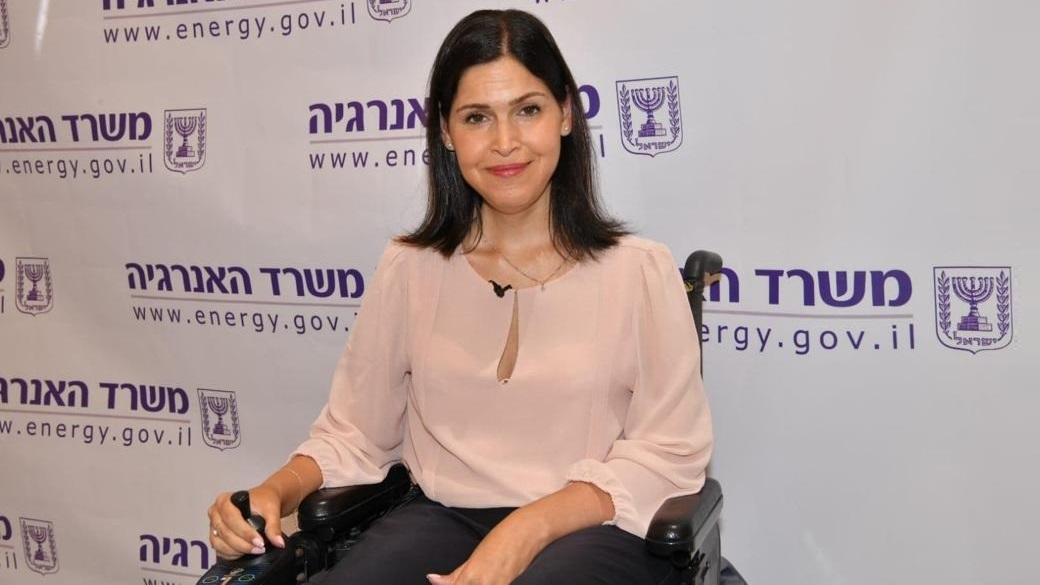Israeli Energy Minister Karine Elharrar To The Media Line: Energy Should Be a Reason for Peace, Not War (with VIDEO)
In an exclusive interview for International Women’s Day, Elharrar tells with The Media Line’s Felice Friedson she would like to see more women in every sector of society
Karine Elharrar broke multiple glass ceilings when she was appointed Israel’s minister of energy and minister of water resources in 2021. She is the first woman in either position and the first person with a disability (she has muscular dystrophy) to serve in an Israeli cabinet.
Born in 1977 to parents who immigrated to Israel from Morocco, Elharrar has law degrees from the College of Management Law School and American University’s Washington College of Law, where she specialized in human rights law.
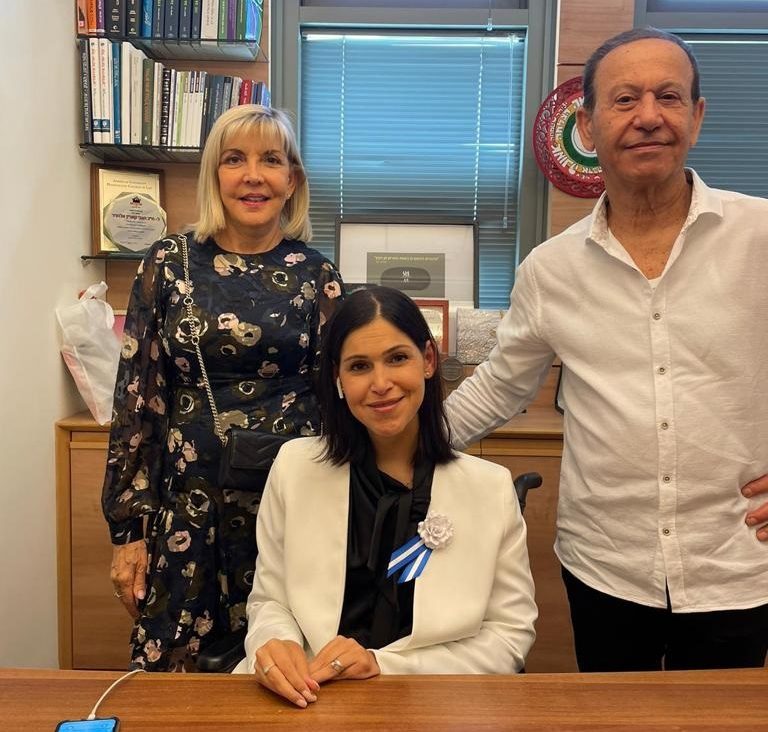
Minister Elharrar with her parents, Colette (L) and Moti (R). (Courtesy)
In 2005, she began working at Bar-Ilan University’s legal clinic for the rights of persons with disabilities, and in 2008 she was appointed director of the university’s legal clinics.
She was among the founders of both the Movement for the War on Poverty in Israel and the Shachar Mitzvah program, which provides free legal assistance to the poor. She has served on committees and boards of directors for many public organizations in Israel, among them the Equal Rights Commission for Persons with Disabilities; the Legal Aid Committee of the Israel Bar Association; the Liaison Organization, which assists families of children and adults with disabilities; the Midot organization, which tests the effectiveness of nonprofit organizations in Israel; and the Kol Zchut (“All Rights”) and Kesher organizations.
She represented the Yesh Atid party in Israel’s parliament, the Knesset, from 2013 to 2919, the Blue and White party in 2019-2020, and again Yesh Atid in 2020-2021.
As a Knesset member, she focused her efforts on protecting the rights of people with disabilities, children, women, victims of violence, and foster families, promoting a number of legislative initiatives in these areas. She was the founder and chairwoman of the lobby for the inclusion of children with disabilities into the Israeli public school system.
In June 2021, she became minister of energy and minister of water resources as part of Israel’s 36th government.
She lives in Rishon Lezion with her husband and two children.
The Media Line: This year, International Women’s Day focuses on climate change and sustainability, so how appropriate is it to kick off with Israel’s minister of national infrastructure, energy, and water resources, Karine Elharrar. The daughter of immigrants from Morocco, Minister Elharrar is deeply involved in her country’s response to environmental issues. Thank you for taking the time with The Media Line!
Elharrar: I’m glad to be here!
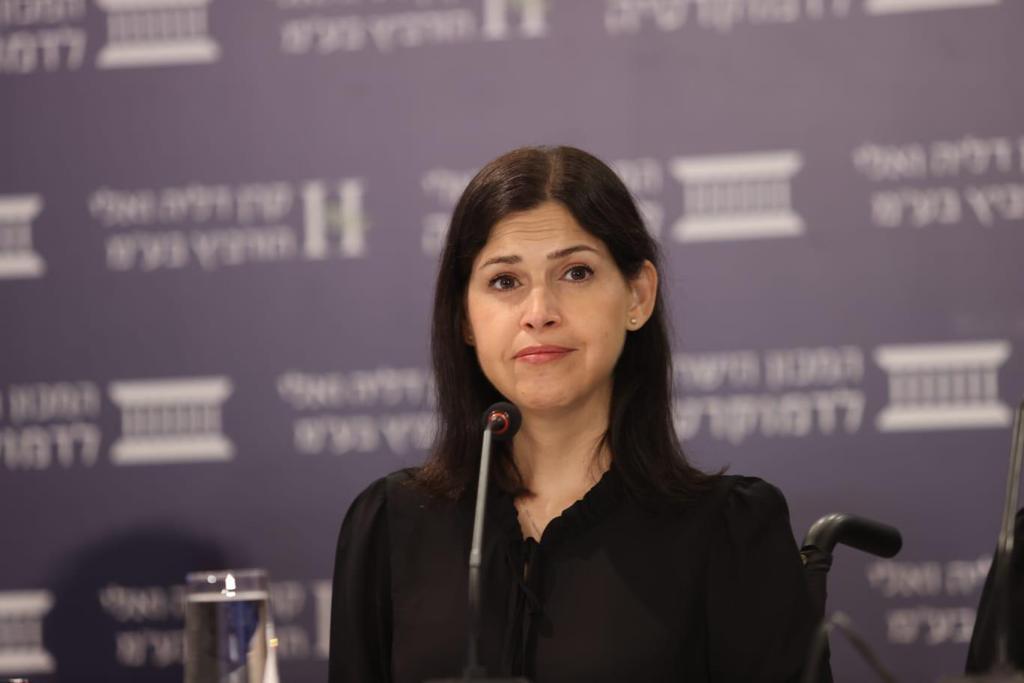
Minister Elharrar addresses the Israel Democracy Institute. (Courtesy)
TML: So, you’ve learned a lot of lexicon – words – about energy.
Elharrar: Yes!
TML: How does that feel?
Elharrar: Well, in the past eight months, that’s what I’ve been doing – energy and energy words, and it’s been fascinating. It’s really a whole world, and as we can see energy is the most important issue that the world is dealing with right now, so I guess it’s a real opportunity for Israel, for the region, and for me, to lead something new.
TML: Minister Elharrar, despite the intense reactions and endless arguments over environmental issues, officials such as yourself are charged with addressing the needs from small to large crises regardless of the cause. What is the top priority for the Middle East?
Elharrar: I think we need to take energy and make it an advantage, and make it a cause of cooperation and partnerships between the countries in the region. I think that each country has an advantage over the other. I see Israel as a midpoint between the old world of energy and the new world of energy, and I think it’s a real opportunity for Israel as a technological country. They call it [the] Startup Nation country, which we are, and we need to take this advantage and to push it forward.
Most of the European countries are committed to net-zero [emissions] by 2050; Israel as well. We have the sense of renewables, and hydrogen is relatively new, but we don’t have a sense of many other technological opportunities that will make us the path to go there.
TML: For example?
Elharrar: I don’t know. There are things that we don’t know about. Just recently, people have been talking about green hydrogen. Blue hydrogen is relatively old. We are talking about time frames that are changing very quickly. We know about renewables, but renewable will not be the solution for 100% green energy, and our goal – my goal as the minister of energy – is to make a mixture of energy sources so we can get there. And I think that we have an advantage of technological ideas that we can make it.
TML: When thinking about water and the Middle East, many still envision endless miles of sand dunes stretching far into the horizon, the only water found at an elusive oasis. As the minister charged with water resources, what are your thoughts about its supply, and particularly its distribution?
Elharrar: Well, Israel is a water miracle. We are located in the middle of the desert, and we suffered in the past from a shortage of water. Due to desalinization, we are able now to supply water not only for Israelis but also for our neighbors. Just recently I signed a DOI [declaration of intent] with the [United Arab] Emirates and Jordan, so we can sell them up to 220 million cubic meters of water [annually], and we can abide from them generated renewable energies from Jordan.
I think it’s great. It’s mitigation and adaptation, and it’s due to the ability of Israel to supply water.
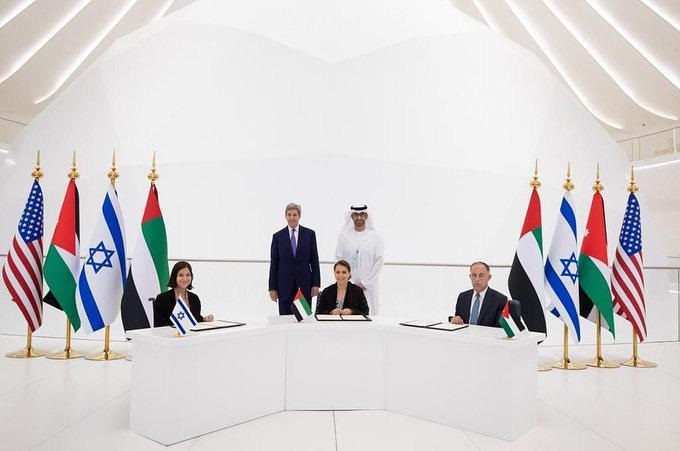
L-R: Israeli Energy Minister Karine Elharrar, UAE Climate Change Minister Mariam Almheiri and Jordan Water and Irrigation Minister Mohammed Al-Najjar sign a water agreement at a Dubai Expo event on Nov. 22, 2021, as US Climate Envoy John Kerry and UAE Crown Prince Mohammed bin Zayed look on. (UAE Foreign Ministry/Twitter)
TML: Do you feel that more and more countries, even enemies of Israel, are going to join on this bandwagon?
Elharrar: I really welcome every country to be our partners, and we are definitely for more and more countries to join the Abraham Accords, and I hope that it will be happening soon.
This holiday season, give to:
Truth and understanding
The Media Line's intrepid correspondents are in Israel, Gaza, Lebanon, Syria and Pakistan providing first-person reporting.
They all said they cover it.
We see it.
We report with just one agenda: the truth.


TML: Anything you can share?
Elharrar: Well, not yet!
TML: It’s become cliché to hear people predict that the next war will be fought over water. Is that a fact or fiction?
Elharrar: It could get to there, and we hope not. I think that’s why it’s [in] Israel’s interest to help other countries in the region, for example, Jordan, which we have a strategic border with them, and hopefully, it will not come to there, but we see that [the] climate crisis is not something that we are talking about the far future. It’s here and now. And we cannot just think that we can be blind to it. So, we need to work together, many countries, to make sure that it will not get to be a big crisis and cause war.
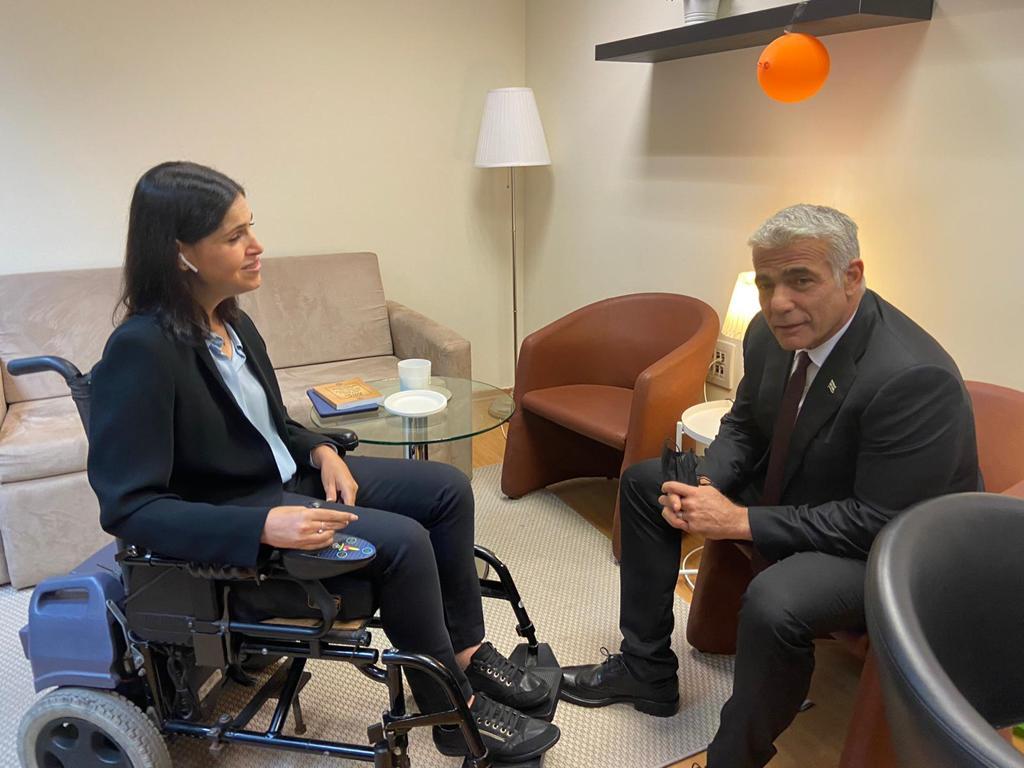
Minister Elharrar with Israeli Foreign Minister Yair Lapid. (Courtesy)
TML: As we speak, the drones of war are sounding. How will the conflict over the Ukraine issue affect world oil prices?
Elharrar: Well, as we can see, it’s affecting [the prices] already, and hopefully they’ll come to a solution. I really hope that the talks with [US President Joe] Biden, [French President Emmanuel] Macron and [Ukrainian President Volodymyr] Zelenskyy will get us somewhere. We see the crisis in Europe, and that leads to a conclusion which I think is our main goal, which is to make a diverse mixture of energy sources.
We cannot rely on one source of energy. We need to have natural gas, renewable [energy sources], hydrogen, and other energy sources. That’s the way to avoid a crisis like we are facing now in Europe.
TML: Not long ago, Arab neighbors in once oil-rich nations began looking for alternative sources of wealth, feeling the future would not sustain the vast wealth attained from the region’s oil industries. So, apropos what you just said, where are they heading? Where are the Middle Eastern countries heading in terms of oil?
Elharrar: I think that oil is still a part, but I can definitely see a change of minds, and I think that we are reaching a path that nobody can neglect anymore the thought that we must think about a more green energy. I joined a conference last week in Cairo, and there were countries [there] from Middle East and Africa, and everybody talked about climate crisis. When you talk about it, you must do something about it. And as far as I can see it, then my opinion is that even the oil [exporting] countries, they know that we cannot just continue the same way as before and we must change our habits of using oil and gas for the future.
It’s something that needs to change, and I think it’s going to change because everybody wants to be part of the common countries that are fighting the climate crisis. The next COP [Conference of the Parties to the UN Framework Convention on Climate Change] is in Sharm (el-Sheikh) and Cairo, and I really hope that we can see some changes between the last group and today.
TML: Anything you can share in terms of the meeting in Cairo?
Elharrar: Well, it was a great conference. I had great talks with my colleagues from Cyprus and Egypt, and hopefully, we will be able to talk about a new cooperation soon.
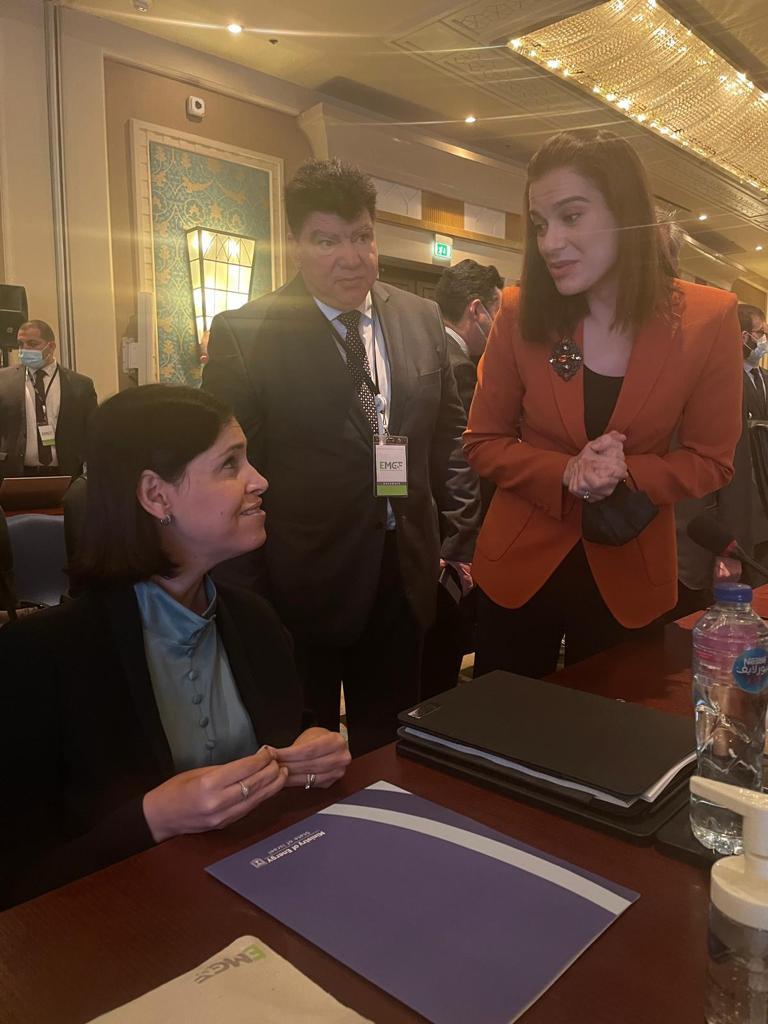
Israel’s Energy Minister Karine Elharrar meets with the energy minister of Cyprus, Natasa Pilides, at the East Mediterranean Gas Forum, November 2021. (Courtesy)
TML: Why did you call for canceling the deal with the UAE to transport crude oil via Israel to Europe?
Elharrar: I think that it’s not a deal between the UAE and Israel. It was a deal between companies. The fact that Israel will only be a bridge in transporting oil in massive quantities is very risky for Israel’s environment, [and] for Israel’s tourism. And I thought that the money that Israel can get out of it from taxes is not worth it, but I know that they’ve come to an agreement of the companies, and the Ministry of Environment are taking care of it. Hopefully, we will not be facing a disaster.
TML: When we hear about the possible gas deals that include Israel and the Arab nations, we have to wonder about what are the chances that fuel will become the lynchpin for peacemaking, rather than the catalyst for war. So, expanding upon what you’ve said earlier, there are issues in terms of security and gas and oil as well. Is there room for flipping everything and having relations with Arab nations in terms of the security, as opposed to always looking at it as a fight over energy?
Elharrar: It is! I think that it doesn’t have to be a reason for war. It can also be a reason for peace. I think that our reservoirs for natural gas – reservoirs that Israel has been blessed with – are sometimes a bridge between our countries. And I’m very happy and proud to be the minister of energy that can lead to partnerships and cooperation between Israel and other countries.
I think that not only natural gas should be our way of leading to it, but also renewables. Israel is a small country and suffers from a shortage of open fields, but our neighbors have many open fields and we can cooperate [with them] like we did with Jordan to buy from them green energy from renewables. I hope we can expand these kinds of agreements with other countries.
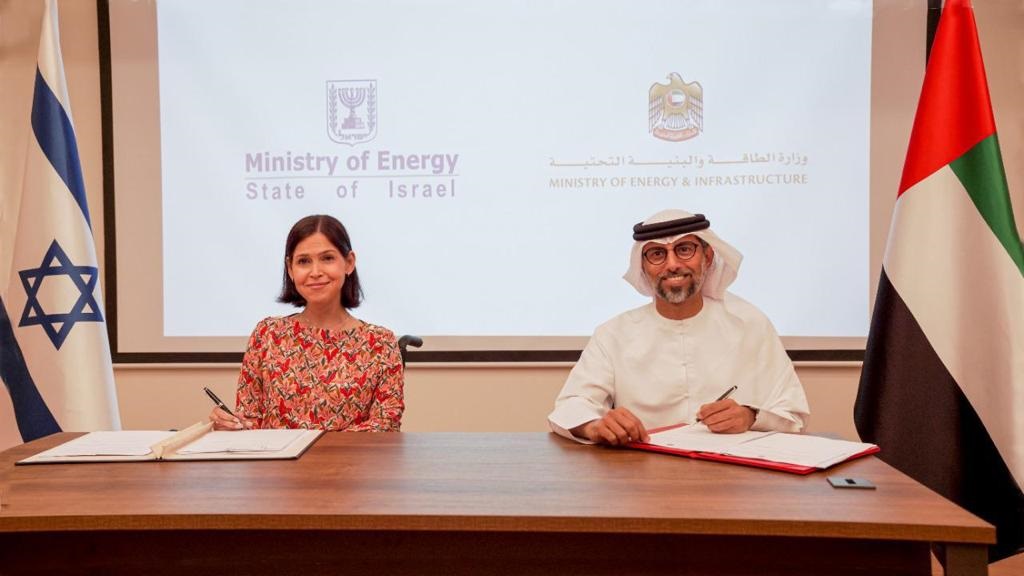
Minister Elharrar signs a memorandum of understanding on clean energy cooperation with UAE Energy Minister Suhail al-Mazrouei at Expo 2020 in Dubai, Nov. 23, 2021. (WAM)
TML: Israel set a target of producing up to 40% renewable energy by 2030…
Elharrar: 30%.
TML: 30%…Oh, OK.
Elharrar: No, it was never…
TML: OK, I’m glad you clarified that. So, there have been some kind of disagreements between the Ministry of Environment and your ministry on how to actually deal with this: Dealing with renewable energy; how to store it; where to use the sun at certain times of the year. What is the problem?
Elharrar: I don’t see it as a problem. The Ministry of Energy is the responsible ministry for renewables. We have to understand that it’s not that easy. It’s not that you put a solar panel and put in a plug, and there you go, you have your renewable [energy source]. It’s a very bureaucratic thing to do, and if you compare Israel to other countries, most of our renewable [energy sources] would be from the sun; from solar [power].
I don’t think, compared to other countries… There is no other country, except maybe Honduras, that has such a high percentage of renewables from the sun. We don’t have wind, we don’t have thermal, we don’t have nuclear [energy]. So, it’s mostly solar. And it’s a very difficult thing to do.
What I’ve said, and I’ve agreed with the Ministry of Environment, is that we have to think of more ways to expand green energy in Israel, but it doesn’t have to be only renewable [energy]. And also in the world, nobody would think that only renewable [energy] would bring the solution. The solution would be from a mixture of energy sources, and that’s what we are working on.
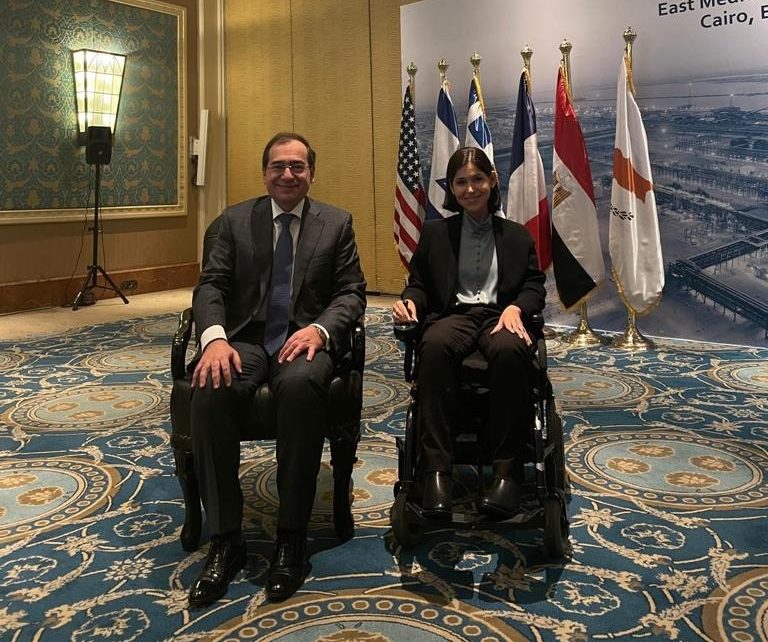
Minister Elharrar with Egyptian Minister of Petroleum and Mineral Resources Tarek El Molla at the East Mediterranean Gas Forum, November 2021. (Courtesy)
TML: Does this trickle down to education and actually teaching youth from a young age in Israel that sustainability is actually different today?
Elharrar: Definitely! I think that everything starts and ends with education, and we are very much involved with the Ministry of Education to educate the children from a very early stage that environment is not something that belongs to a certain population, but to everybody, and we all have to be a part of saving the planet.
TML: Minister Elharrar, you seem to attract the attention of power people and propitious programs. You elicited an apology from the British prime minister when a conference under his auspices lacked wheelchair facilities, and you more recently received a greeting heard by the world where [Egyptian] President [Abdel Fattah] Sisi crossed the auditorium floor to welcome you. So, it seems that you’re involved in women’s empowerment as well as environment. How does that feel?
Elharrar: Well, I have to say it was a bit awkward for me to get all of the attention in Glasgow. It was not from the right perspective, as far as I could see it, but I want to take this advantage and call many more women to join the energy world. It’s really something that I cannot get, that when I enter a room, most of the people are men, and I think that we should encourage more and more women to come and be a part [of this].
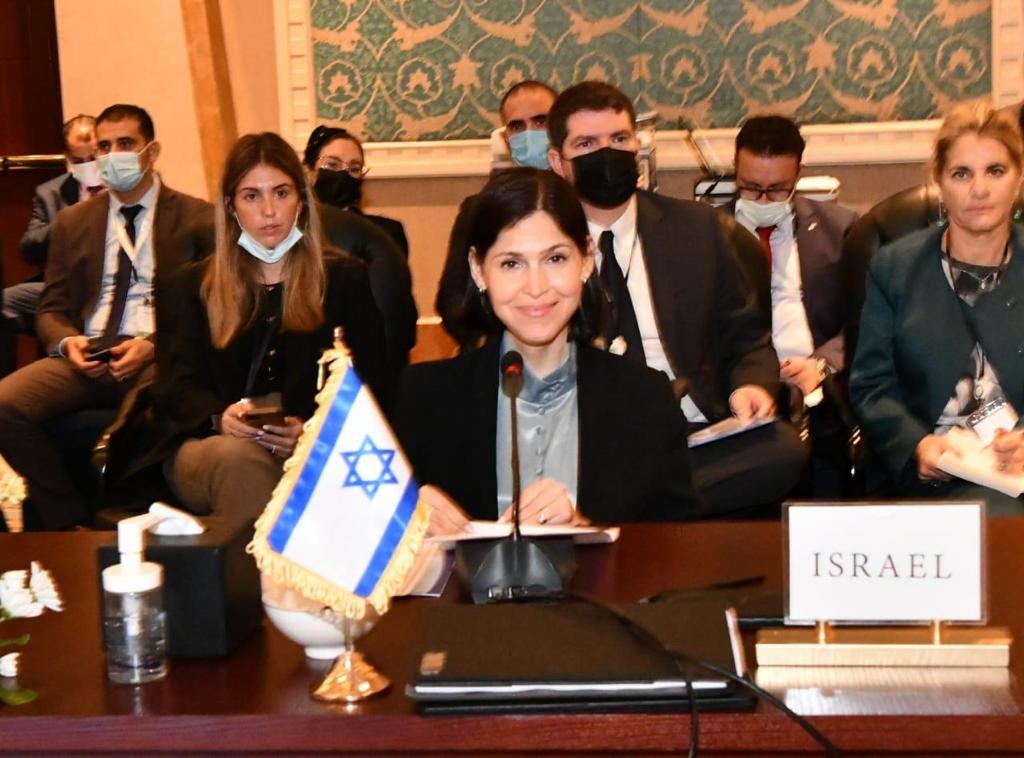
Minister Elharrar at the East Mediterranean Gas Forum, November 2021. (Courtesy)
TML: Why do think that is?
Elharrar: You know, it was designed as a man’s world! And I think that we should change it. And I’m working on it, but I think it was very nice of Sisi to welcome me. It was really a warm gesture. I hope that we’ll have more and more meetings between Israelis and other countries from the region, and I really want the next conference to be with more women.
TML: International Women’s Day – it’s all about women, and this year it’s about climate change and sustainability, so as I began this interview, we talked about how it was really appropriate to speak with you. What is really your message that you would convey? And you started to say more women in energy. Take it the next step in terms of what they should be doing in terms of their homes, the buying power they have, the things that they do, in terms of energy, as well.
Elharrar: I think that what I really want to happen, is that more women will be everywhere, also [in] energy, but not only. Energy is a sector that I’m dealing with these days, but I can tell it in any sector. And there is a saying by the late Ruth Bader Ginsburg [answering the question, when will there be enough women on the Supreme Court]: “When they will be nine” [women] for the Supreme Court. I want women to be everywhere, and hopefully, we can get there.
TML: You weren’t always dealing with energy, so what’s really your passion?
Elharrar: I came out to politics with a passion of education, welfare, [and] health, but you know when you really think about it, it’s already combined. Energy is about education as well, and it can disturb the health, and I think it’s a new and fascinating word, but it’s all coming together eventually.
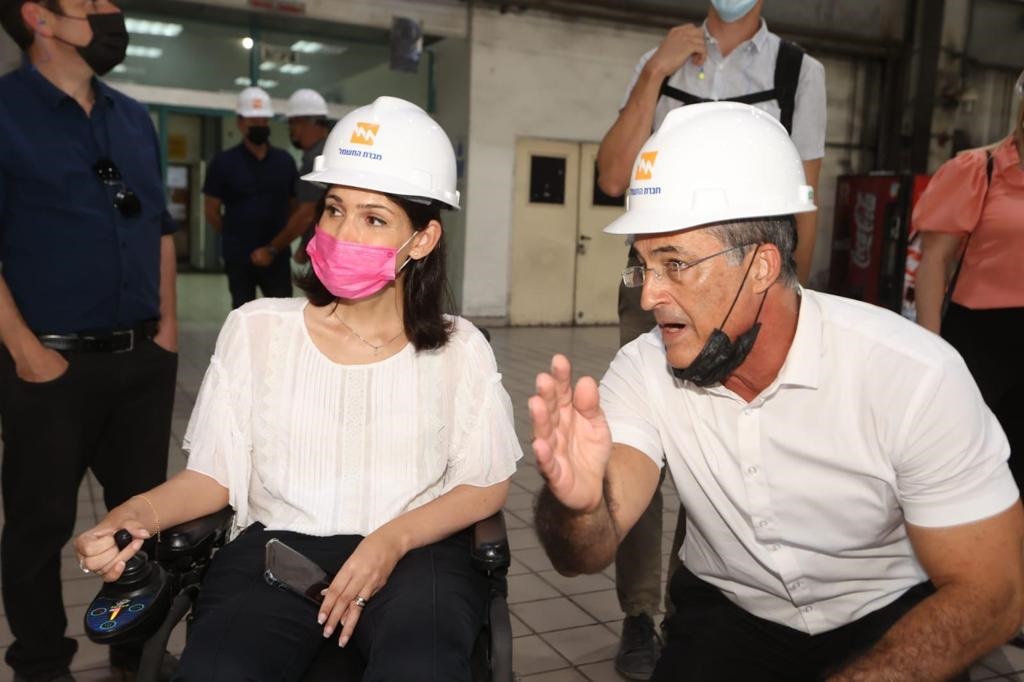
Minister Elharrar visits the Israeli Electric Company. (Yossi Weiss/IEC)
TML: Where did you learn English?
Elharrar: At school!
TML: It’s pretty good!
Elharrar: Thank you!
TML: Minister Elharrar, we talk to youth. I’d love to convey a message to a young woman who is thinking of going into politics to be sitting in your seat one day. What would you say to her?
Elharrar: If it’s really your passion, dream about it and do it! You can do it like any man, and even better, and please don’t give up your hopes and dreams.
TML: When you spend time with your young kids, and I’m sure you don’t have enough of that these days…
Elharrar: Not enough!
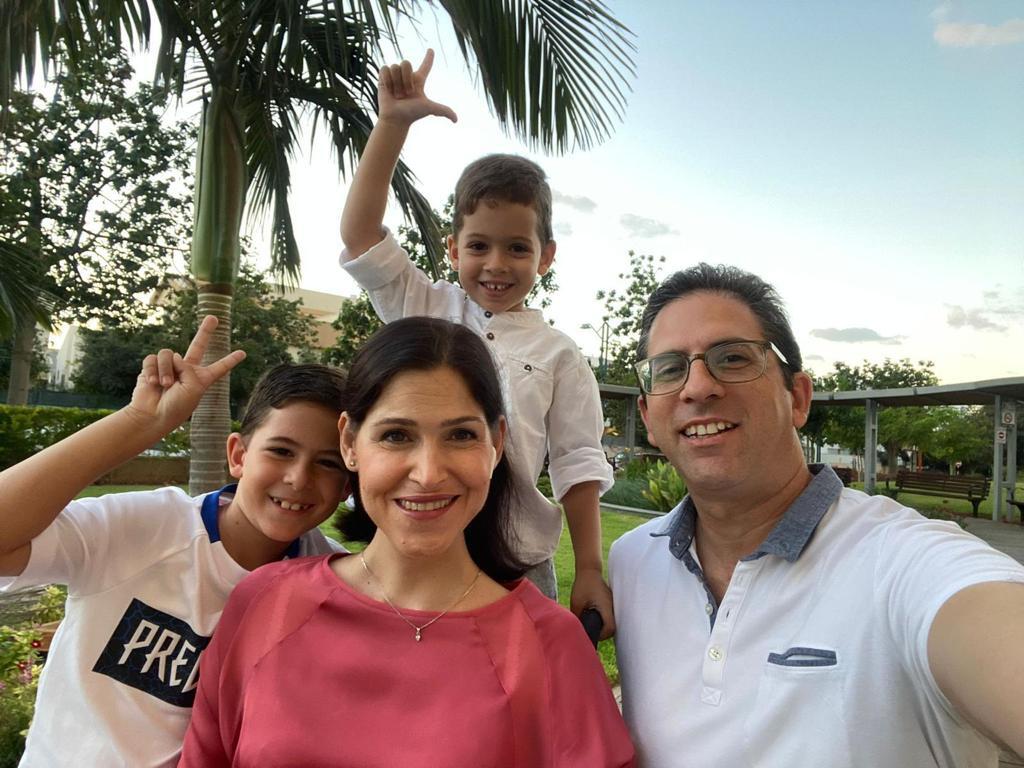
Minister Elharrar with her husband and children. (Courtesy)
TML: What are the favorite things you like to do?
Elharrar: Just to sit with them [and] read to them stories, and just to hear about what they want to do, and do all that is in my ability to fulfill their dreams.
TML: Minister Karine Elharrar, quite a pleasure! Thank you so much for sharing as the International Women’s Day is upon us.
Elharrar: Thank you very much!
